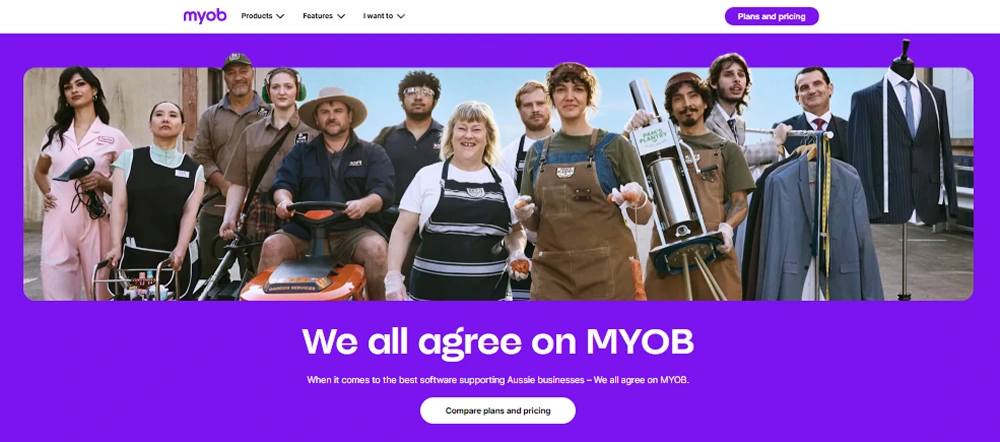MYOB Overview & 2026 Industry Position
MYOB (“Mind Your Own Business”) has long been a foundational tool for accounting, payroll, and business management in Australia and New Zealand. In 2026, it remains a powerhouse for SMEs seeking reliable compliance, tax, and financial insights — while accelerating into modern cloud-first operations, embedded financial services, and AI-assisted automation. With over three decades of experience, MYOB offers a holistic platform that adapts to the long tail of business types across ANZ — from tradies and consultants to startups and mid-tier enterprises.
From Launch to 2026: MYOB’s Journey
Founded in the early 1990s in Melbourne, MYOB quickly became a household name in desktop accounting across Australia and New Zealand. Its significant milestones include:
- 1991: Initial software release on Macintosh for Australian small businesses
- 2004: Acquisition of Solution 6, boosting its enterprise reach
- 2013: Launch of AccountRight Live, marking the start of cloud-first products
- 2016: Acquisition of Greentree to enter mid-market ERP
- 2019: Acquired by KKR, enabling renewed investment in product and infrastructure
- 2023: Embedded lending and payments introduced within the platform
2026 Strategy: Transition from accounting software to an intelligent business operations hub, focused on embedded financial tools, industry modularity, and AI-assisted compliance in the AU/NZ landscape.

MYOB Key Features
The MYOB platform delivers accounting, payroll, inventory, tax, and time-tracking tools, tailored by business size and sector. Key features include:
- Single-touch payroll and automated ATO reporting
- Real-time bank feeds with AI-powered transaction matching
- Accrual or cash-based invoicing systems with automatic recurring billing
- GST and BAS pre-filing support
- Industry-focused modules for retail, trades, professional services, and manufacturing
- Embedded invoicing and payment collection (via MYOB Money or Stripe)
- Job cost tracking, budgeting, and profitability analysis
Workflow & UX
MYOB delivers a sleek, responsive UI — fully web-based across most plans — designed for clarity over complexity. Workflows are logically grouped around accounting cycles: money in (sales), money out (expenses), employee payroll, and reporting. Navigation is sidebar-driven, with collapsible cards and dynamic tables handling bulk entries intuitively.
The mobile app (MYOB Capture and Essentials) simplifies receipt tracking, approvals, and quote creation on the go. For businesses transitioning from spreadsheets or legacy systems, MYOB includes onboarding guides and AI-recommended task automation from week one.
MYOB Pricing Analysis & Value Metrics
| Plan | Cost /mo (AUD) | Features |
|---|---|---|
| Business Lite | $15 | Quotes, Invoices, Bank Feeds, GST/BAS, Expenses |
| Business Pro | $30 | Everything in Lite + Payroll for 1, Reporting, Mobile + Reminders |
| AccountRight Plus | $120 | Full desktop/cloud hybrid incl. inventory, jobs, multicurrency |
| MYOB Advanced | Custom | SaaS ERP for Mid-Market: HR, Projects, CRM, Manufacturing |
Value Assessment: MYOB is competitively priced for micro and growing businesses. Business Lite suits sole traders or consultants (high ROI), while AccountRight is ideal for cost-sensitive SMBs needing deeper functionality without SaaS ERP pricing. MYOB Advanced requires consultation but is full-stack ERP compliant.
Competitive Landscape
| Platform | Strengths | Ideal For |
|---|---|---|
| Xero | Simpler UX, more integrations | Sole traders, startups |
| QuickBooks AU | Payroll packages, U.S brand trust | Retailers, freelancers |
| MYOB Business | Local support, compliance tailoring | SMEs needing ATO-ready tools |
| Sage Intacct | Advanced analytics, global scale | Enterprise, accounting teams |
Unlike global-first tools, MYOB Business aligns tightly with local tax systems, industry norms, and small business needs — offering a more tailored Australian experience.
MYOB Use Cases
While versatile across industries, MYOB excels in scenarios where compliance, operational complexity, and inventory or team management are prevalent. Common use cases:
- Trades & Construction: Job tracking + employee payroll + supplier bills
- Professional Services: Time billing, recurring clients, tax prep
- Retail & Wholesale: Inventory, POS integrations, cashflow forecasting
- Startups: BAS setup, startup costs, founder payroll
Powerful Integrations
MYOB integrates with 200+ leading tools across banking, e-commerce, CRMs, point-of-sale, and logistics:
- Payments: Stripe, PayPal, MYOB Money
- E-Commerce: Shopify, BigCommerce, WooCommerce
- POS: Vend, Kounta, Lightspeed
- Banking: Commonwealth, NAB, Westpac bank feeds
- CRMs: Salesforce, HubSpot, Zoho
These integrations reduce manual entry, create connected workflows, and support seamless cashflow management — crucial for SMEs navigating seasonal demands.
Pros & Cons
- Pros: Excellent AU/NZ compliance; scalable plans; deep feature set for accountants
- Local support and tax-friendly interfaces
- Inventory and time costing built-in
- Trusted by over 1 million businesses regionally
- Cons: Slightly steeper learning curve than Xero/QuickBooks
- Some features restricted to desktop (AccountRight)
- Advanced ERP requires bespoke demo and integration
Pro Tip: If you’re switching from Excel or paper-based systems, activate MYOB’s AI coding suggestions to automate payables categorization in your first week.
Final Thoughts
In 2026, MYOB remains a go-to for compliance-first Australian and New Zealand businesses. Its toolset is robust and its evolution impressive — closing the gap between simple accounting and full business oversight. For businesses looking for local reliability with increasingly intelligent automation and scalable growth paths, MYOB Business delivers strong ROI and platform trust.
MYOB Q & A
Yes, MYOB provides guided data migration tools for Xero, QuickBooks, and Excel users, including support for importing contacts, invoices, and chart of accounts.
Yes, depending on the plan. Business Pro includes payroll for 1 employee, while AccountRight and Advanced support full-featured, multi-user payroll systems.
Trades, retail, professional services, and manufacturing are among the top industries using MYOB for accounting, payroll, and inventory control.
Not necessarily. Plans like Business Lite and Pro are fully cloud-based. AccountRight is a hybrid desktop app, while Advanced is a browser-native SaaS ERP.
Yes, MYOB Business Lite and Pro are great fits for startups needing GST compliance, billing, bank feeds, and scalable payroll as they grow.

